|
|
WEDNESDAY/ 30 SEPTEMBER 2020
|
DISCUSSION PAPER
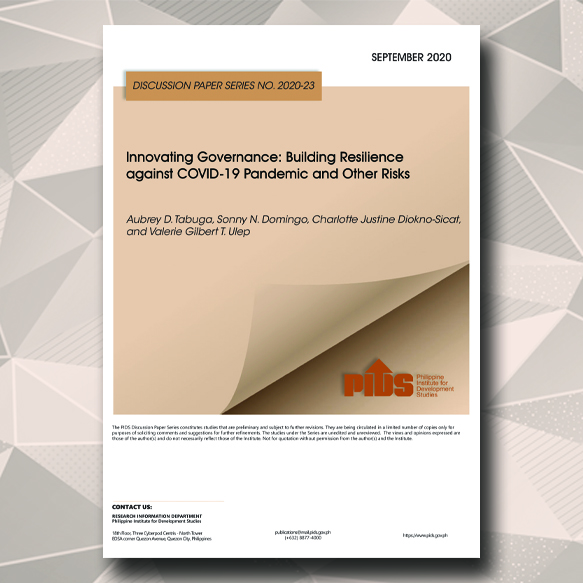 DP 2020-23:
Innovating Governance: Building Resilience against COVID-19 Pandemic and Other Risks DP 2020-23:
Innovating Governance: Building Resilience against COVID-19 Pandemic and Other Risks
by Aubrey D. Tabuga, Sonny N. Domingo,
Charlotte Justine Diokno-Sicat, and Valerie Gilbert T. Ulep
The unprecedented coronavirus disease (COVID-19) pandemic is the most challenging public health crisis the world has faced in a century. It has overwhelmed global and national health service and disaster management infrastructure and brought economies to a standstill/halt. It serves as both an eye-opener and an impetus to leapfrog reforms to strengthen governance systems and structures. It propels us to innovate and install more forward-looking systems and strategies that will enable us to permanently gain the capacity to survive and win over multiple and complex challenges that we face now and in the future. In the public sector, the pandemic shows the importance of having harmonization and synergy between and among national government agencies and sub-national governments. It has illustrated the importance of investing in digital education, e-commerce, and innovative ways of delivering social protection as well as fostering business innovations to meet fast-changing demand. The literature discusses quite a number of public sector innovations, particularly in developed countries and the approaches are combinations of various governance methods, with styles varying depending on the context. Yet on the overall, the public sector has very few models for innovation. This background paper briefly scans the recent literature of public sector innovations and other efforts implemented in the strengthening of governance systems. The goal is to gather insights that may be useful for the Philippines case for enhancing its governance strategies, improving overall performance in service delivery, and building resilience against risks in the long term. Click here to download the discussion paper.
DEVELOPMENT RESEARCH NEWS
DRN 2020 Vol. 38 No. 3: Expert flags fiscal risk in SC ruling
on LGU revenue share
by PIDS Research Information Staff
The third issue of the Development Research News (DRN) centers on the challenges affecting effective service delivery of local government units (LGUs). The banner article talks about the fiscal risk of increasing LGUs' share in the national taxes starting 2022 as a result of the Supreme Court ruling on the petition to revisit the computation of the internal revenue allotment. Such increase, however, could help LGUs perform their devolved functions effectively. The DRN also features articles on how LGUs perform in terms of planning, budget spending, and disaster risk reduction and management efficiency. Other local-level issues, such as poor access to weather information among small farmers in Benguet, the need to reform energy regulations to maximize the potential of distributed energy resources, and the unfair red-tagging of indigenous peoples in the country, are also discussed in this quarter's DRN. Completing this issue are an article on the unclear benefits of China's Belt and Road Initiative to the country and an infographic on the maldistribution of health workers across the Philippines. Click here to download the newsletter.
|
October 8, 2020, 2:00–4:30PM
Simulating the Impacts
of COVID-19 on Poverty
and Income Distribution
in the Philippines
(watch the livestream on the
PIDS Facebook page)
October 15, 2020, 2:00–4:30PM
Weather and Climate Information Needs
of Small Farmers
(watch the livestream on the
PIDS Facebook page)
October 22, 2020, 2:00–4:30PM
Results of the Process Evaluation of the Performance-Based Bonus (PBB) Scheme
(watch the livestream on the
PIDS Facebook page)
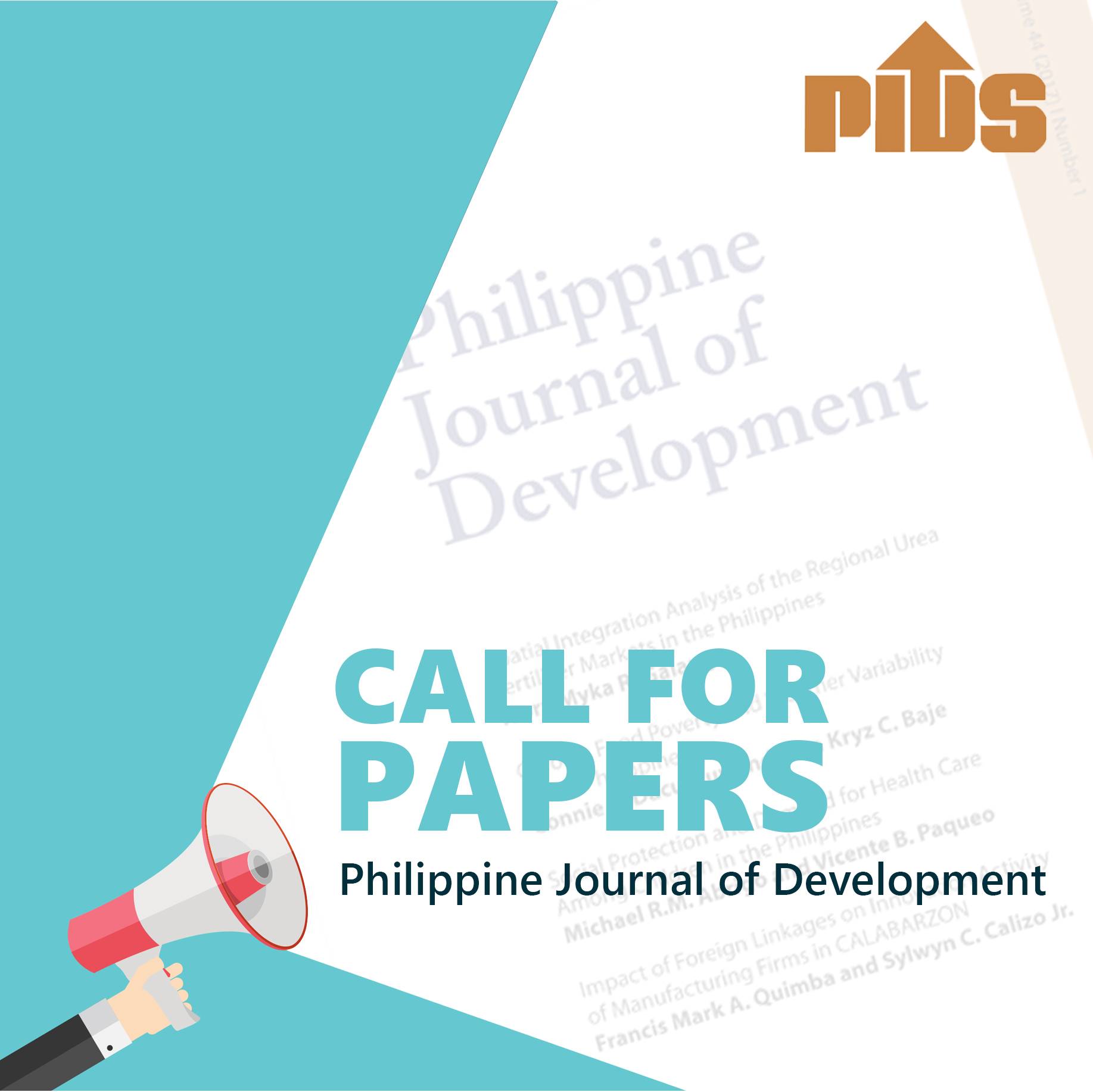
CLICK HERE for the guidelines in the preparation of articles. Submissions and inquiries may be sent to PJD@mail.pids.gov.ph.
|
 E-finance key to helping Filipinos cope with COVID-19 pandemic E-finance key to helping Filipinos cope with COVID-19 pandemic
With the community quarantine still in effect in the country since March due to the COVID-19 pandemic, digital services and platforms became the primary means of transaction among Filipinos. Digital payments, for one, have become a necessity.
In her presentation during the 18th Development Policy Research Month (DPRM) virtual kickoff forum held recently, Bangko Sentral ng Pilipinas (BSP) Assistant Governor Iluminada Sicat said that the BSP noted a marked increase in electronic fund transfers vis-à-vis automated teller machine (ATM) withdrawals and check transactions during the community quarantine from March to May. Without a vaccine for COVID-19, she added that this increasing trend in digital transactions is expected to continue “even as lockdown measures are eased”. READ MORE
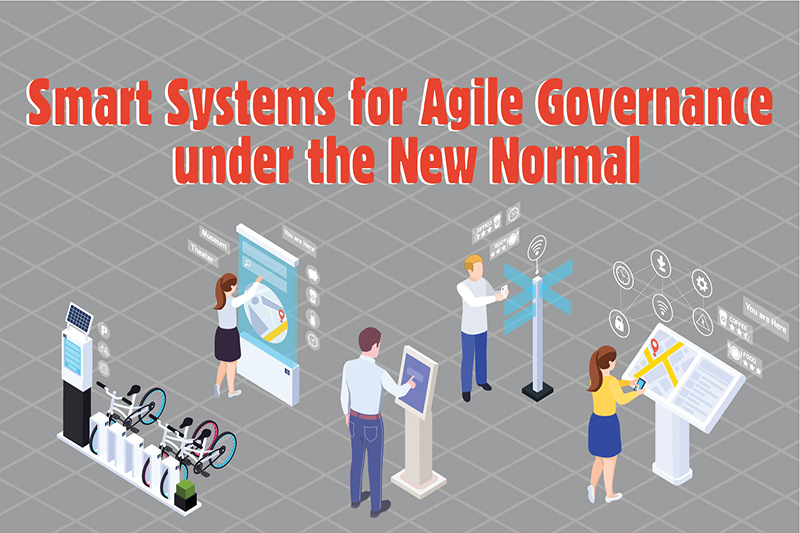 Gov't must adopt smart solutions to deal with the pandemic, other risks Gov't must adopt smart solutions to deal with the pandemic, other risks
Both national and local governments should adopt smart solutions and invest in emerging technologies to deal with risks such as climate change, natural hazards, and the COVID-19 pandemic.
This is according to Aubrey Tabuga, Sonny Domingo, Charlotte Justine Sicat, and Valerie Gilbert Ulep, researchers at state think tank Philippine Institute for Development Studies (PIDS), in their discussion paper titled “Innovating Governance: Building Resilience Against COVID-19 Pandemic and Other Risks”.
The study noted that the rising population and rapid urbanization demand the adoption of more “process, product, organizational, and communication innovations” and smart reforms to address environmental concerns, socioeconomic problems, and other related issues. READ MORE
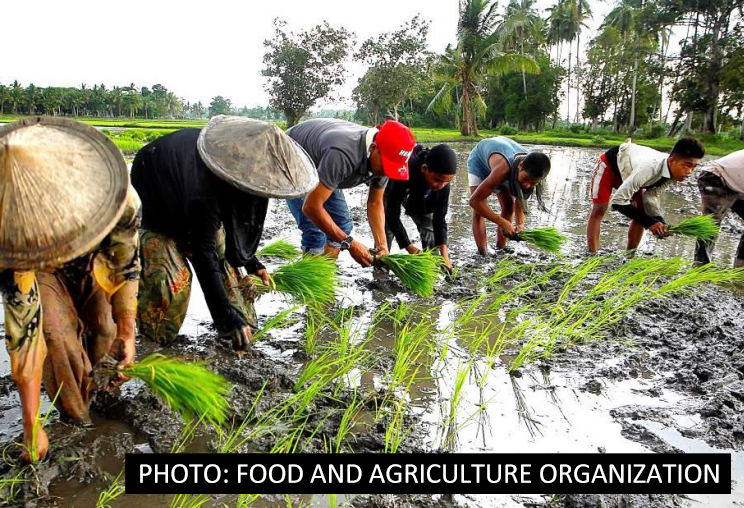 Innovate agri sector to ensure food security, boost resilience amid pandemic Innovate agri sector to ensure food security, boost resilience amid pandemic
and other crises
Innovating the country’s agriculture sector is necessary to ensure food security amid the COVID-19 pandemic and to improve the sector’s resilience to other risks.
This is the key message of this year’s 6th Mindanao Policy Research Forum (MPRF), which is jointly organized by the Philippine Institute for Development Studies (PIDS), Mindanao Development Authority (MinDA), and the Ateneo de Davao University (AdDU). The virtual forum, which is slated for September 18, will be hosted by AdDu through its University Research Council. READ MORE
 Gov't must innovate to win the fight against COVID-19 pandemic, other risks Gov't must innovate to win the fight against COVID-19 pandemic, other risks
The government must implement reforms and innovations to overcome the COVID-19 pandemic and other similar crises.
This is the key message of this year’s 6th Annual Public Policy Conference (APPC), which is the main and culminating activity of the Development Policy Research Month (DPRM) celebration, led by the Philippine Institute for Development Studies (PIDS) every September.
The 6th APPC will feature the topic “Innovating governance: Building resilience against COVID-19 and other risks” in a four-part webinar series on September 15, 17, 22, and 24. READ MORE
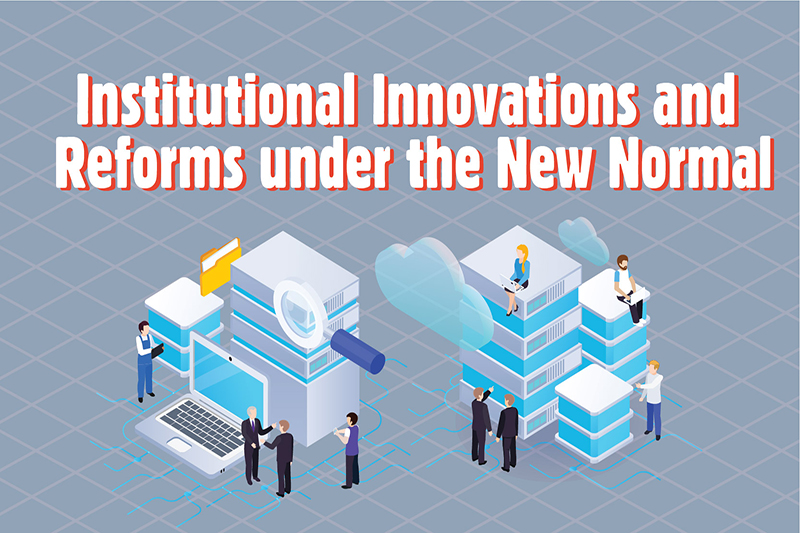 Integrate data and info systems, strengthen coordination in gov't to deal with COVID-19 and other crises--PIDS Integrate data and info systems, strengthen coordination in gov't to deal with COVID-19 and other crises--PIDS
The lack of accurate information on beneficiaries and poor coordination across different levels of government are among the major issues that surfaced during the pandemic.
This is according to Aubrey Tabuga, Sonny Domingo, Charlotte Justine Sicat, and Valerie Gilbert Ulep, researchers at state think tank Philippine Institute for Development Studies (PIDS), in their discussion paper titled “Innovating Governance: Building Resilience Against COVID-19 Pandemic and Other Risks”. READ MORE
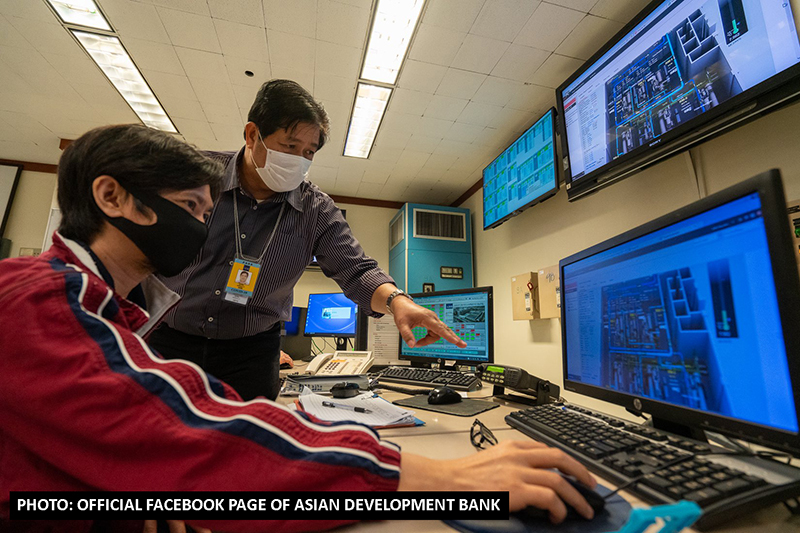 Sound e-government system, crucial to efficient delivery of services in the 'new normal' Sound e-government system, crucial to efficient delivery of services in the 'new normal'
As the government intensifies its response to the COVID-19 pandemic, well-designed e-government platforms are crucial to ensure the efficient and timely delivery of public services.
In a discussion paper of the Philippine Institute for Development Studies (PIDS) titled “Innovating Governance: Building Resilience Against COVID-19 Pandemic and Other Risks”, PIDS researchers Aubrey Tabuga, Sonny Domingo, Charlotte Justine Sicat, and Valerie Gilbert Ulep emphasized the importance of e-government in the seamless delivery of government services during the pandemic and other similar crises. READ MORE
|
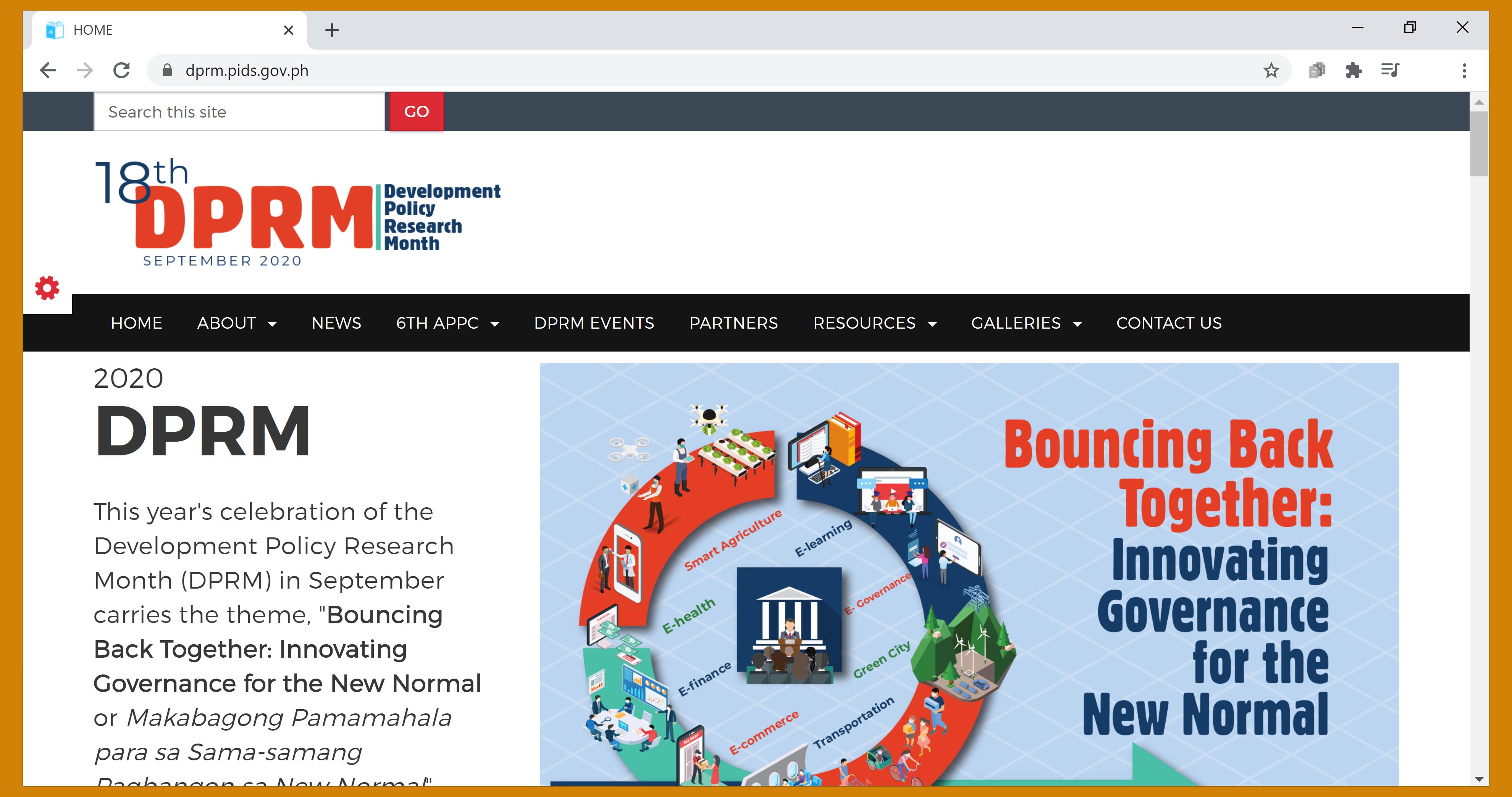 Malacañang Proclamation 247, dated September 2, 2002, declared the month of September as Development Policy Research Month (DPRM) to promote and draw nationwide awareness of the importance of policy research in the formulation of evidence-based plans, programs, and policies. This year's theme is "Bouncing Back Together: Innovating Governance for the New Normal", or in Filipino, "Makabagong Pamamahala para sa Sama-samang Pagbangon sa New Normal ". Through this theme, the PIDS intends to emphasize the need to innovate governance across all sectors of society to steer the country toward renewed growth and dynamism. Malacañang Proclamation 247, dated September 2, 2002, declared the month of September as Development Policy Research Month (DPRM) to promote and draw nationwide awareness of the importance of policy research in the formulation of evidence-based plans, programs, and policies. This year's theme is "Bouncing Back Together: Innovating Governance for the New Normal", or in Filipino, "Makabagong Pamamahala para sa Sama-samang Pagbangon sa New Normal ". Through this theme, the PIDS intends to emphasize the need to innovate governance across all sectors of society to steer the country toward renewed growth and dynamism.
Visit the DPRM 2020 website to know more about this year's theme, the participating agencies and their DPRM banners, presentations and videos from the webinars, and related publications contributed by our partners. This website will remain online until the next DPRM.
Click here to access the website. |
FACT FRIDAY (DPRM 2020 edition)
Every Friday, PIDS releases nuggets of research results culled from different PIDS studies. This month's series highlights the topics featured in this year's Development Policy Research Month (DPRM). These topics are Institutional Innovations and Reforms, Innovations in Civil Service, E-government, and Smart Cities and Smart Governance. The content of these infographic slideshows was based on the PIDS discussion paper titled "Innovating governance: Building resilience against COVID-19 pandemic and other risks".
Click the images below to access these #PIDSFactFridayDPRMEdition issues.
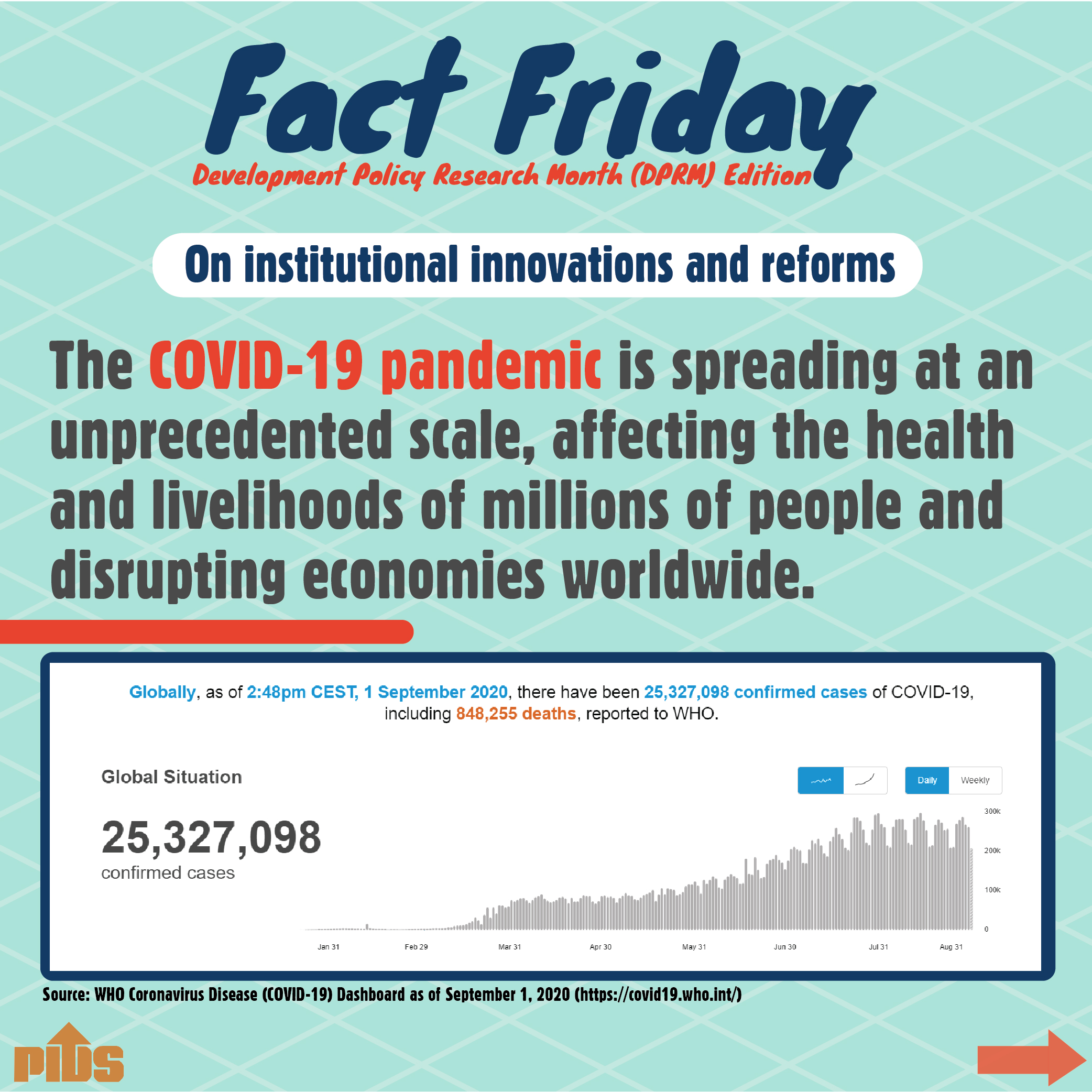 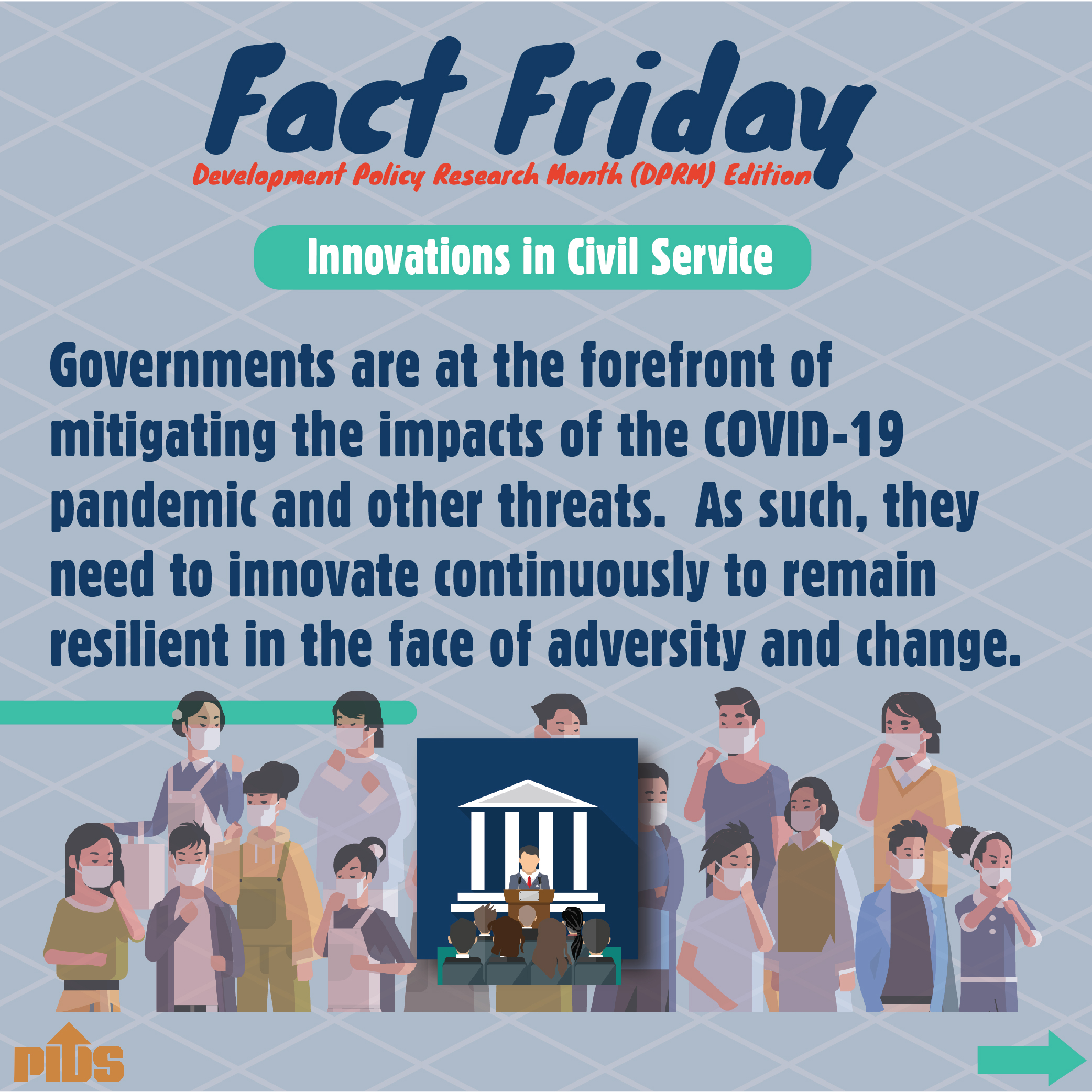 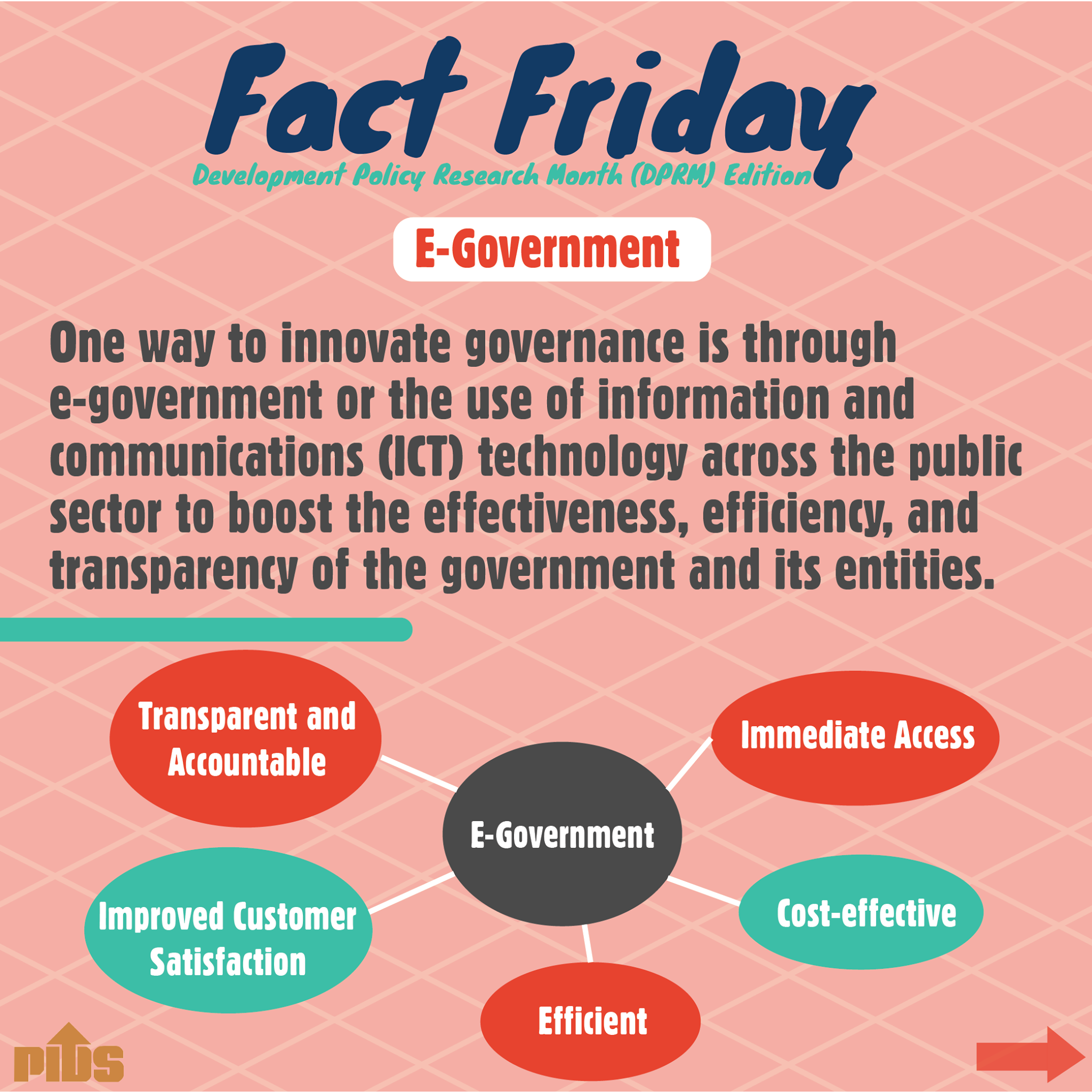 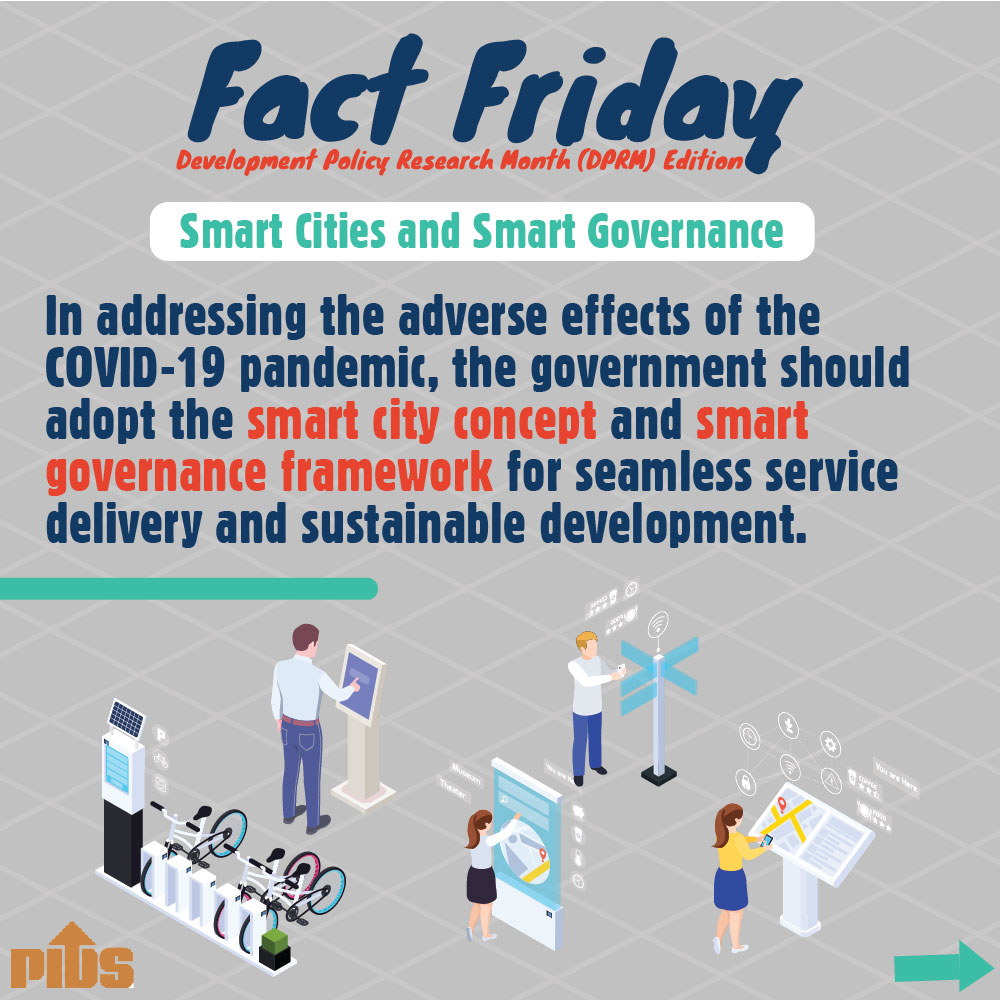
Like us on Facebook for more #PIDSFactFriday issues. |
DPRM/APPC videos
Watch these videos to know more about the Development Policy Research Month (DPRM) and the key message of this year's theme:
"Bouncing Back Together: Innovating Governance for the New Normal".
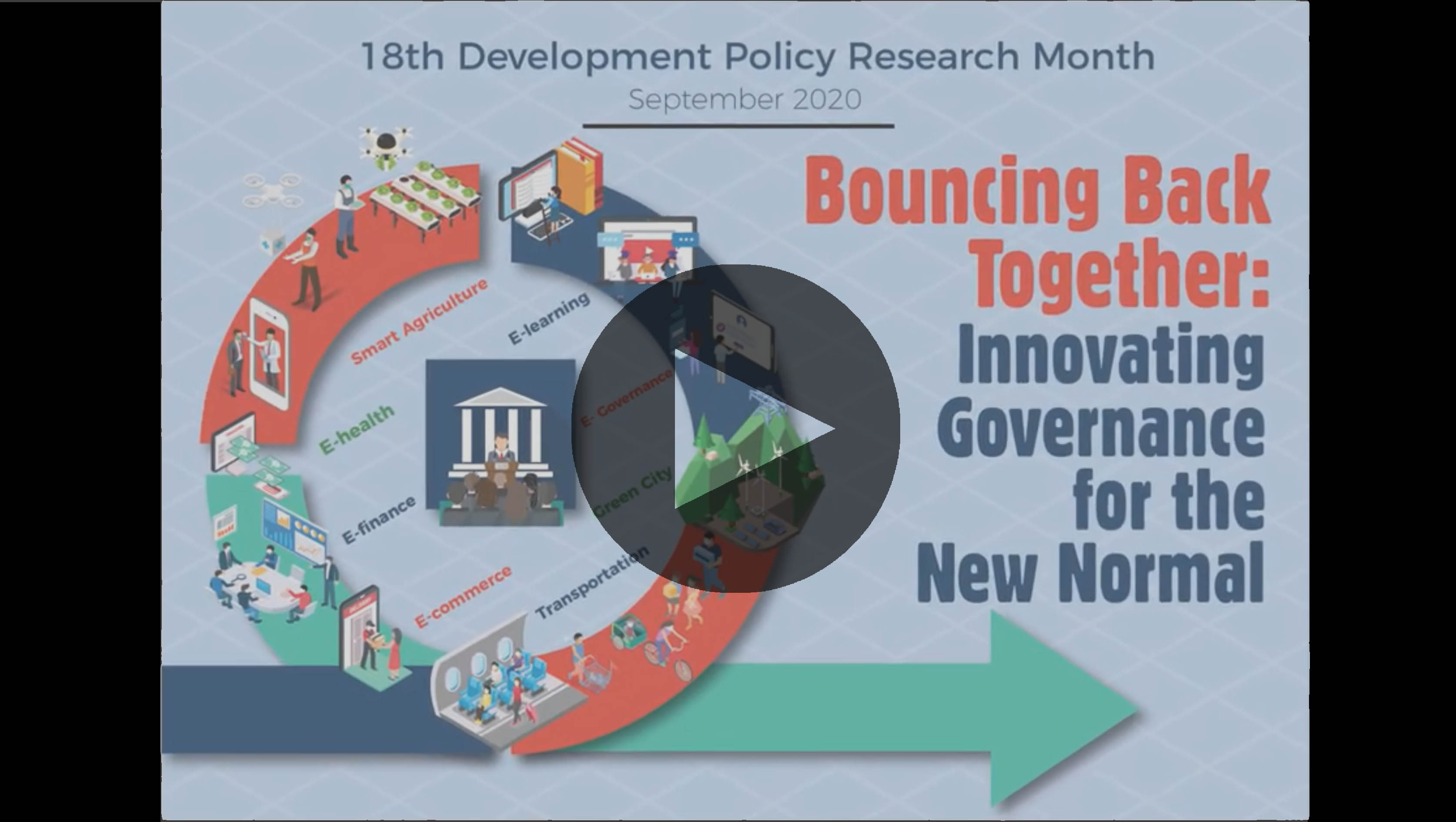
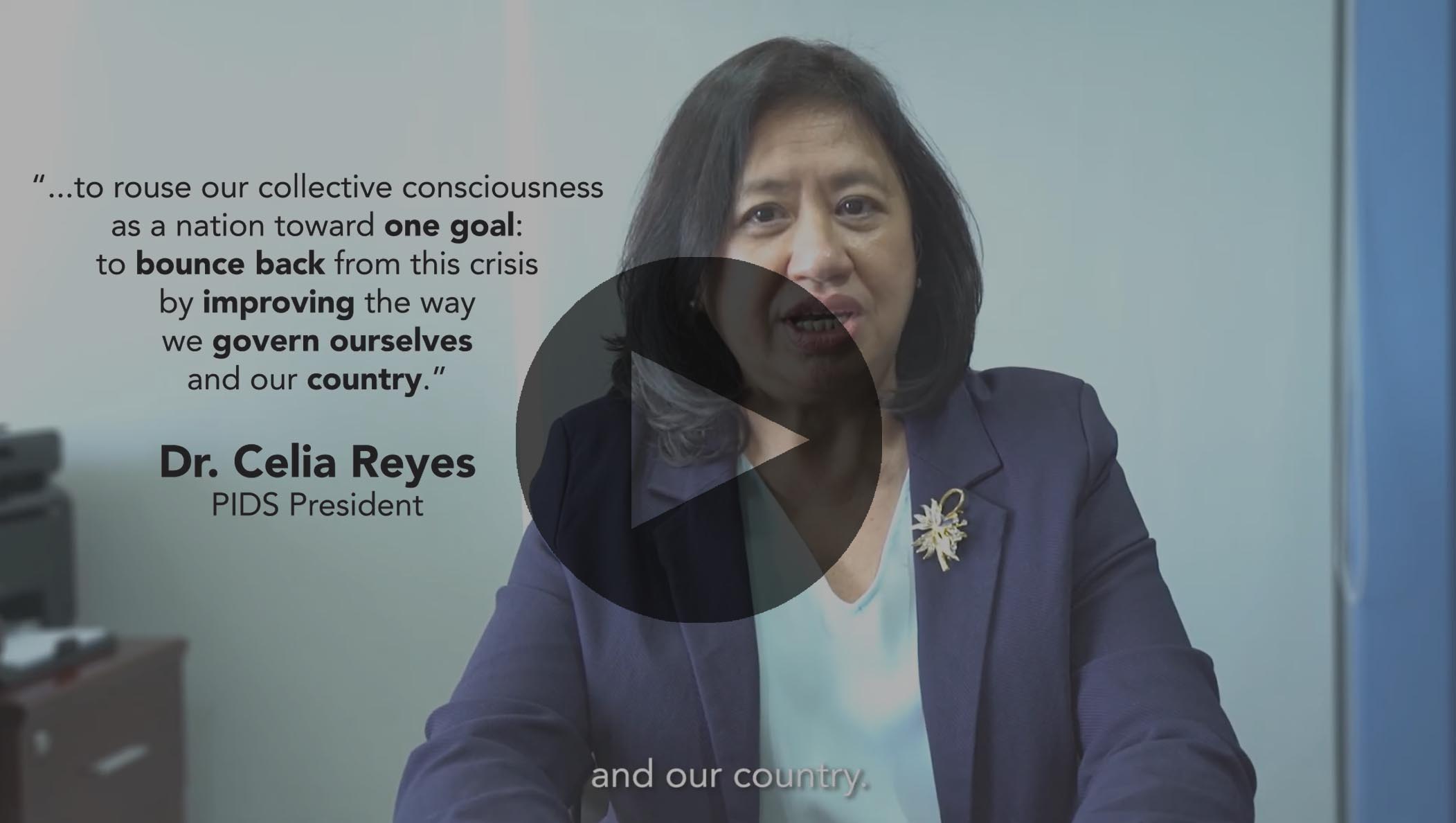 |

Need help? Have feedback? Feel free to contact us.
© 2020 Philippine Institute for Development Studies.

 
|
|

 E-finance key to helping Filipinos cope with COVID-19 pandemic
E-finance key to helping Filipinos cope with COVID-19 pandemic






 Malacañang Proclamation 247, dated September 2, 2002, declared the month of September as Development Policy Research Month (DPRM) to promote and draw nationwide awareness of the importance of policy research in the formulation of evidence-based plans, programs, and policies. This year's theme is "Bouncing Back Together: Innovating Governance for the New Normal", or in Filipino, "Makabagong Pamamahala para sa Sama-samang Pagbangon sa New Normal ". Through this theme, the PIDS intends to emphasize the need to innovate governance across all sectors of society to steer the country toward renewed growth and dynamism.
Malacañang Proclamation 247, dated September 2, 2002, declared the month of September as Development Policy Research Month (DPRM) to promote and draw nationwide awareness of the importance of policy research in the formulation of evidence-based plans, programs, and policies. This year's theme is "Bouncing Back Together: Innovating Governance for the New Normal", or in Filipino, "Makabagong Pamamahala para sa Sama-samang Pagbangon sa New Normal ". Through this theme, the PIDS intends to emphasize the need to innovate governance across all sectors of society to steer the country toward renewed growth and dynamism. 






